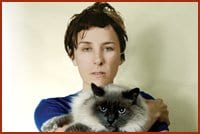Melissa Ferrick is starting over.
She tells me this over the phone, collapsed on her couch at home in Newburyport, Massachusetts. Having spent the last few days immersed in Brooklyn Pride festivities, Ferrick is tired but elated. She seems happy to share a few moments of her time as she talks breathlessly of choices and heartache, dreams and paintings, love and dating and the way she’s pouring these experiences into her new album.
Ferrick talks and talks and in the comfort of the conversation it’s hard to imagine you had never spoken before.
Intimacy. It’s an endearing trait, one that’s won her the loyalty of fans since 1991. And it’s the way that Ferrick’s honesty and vulnerability translates to melody and lyrics that has earned the respect of musicians and the adoration of lesbian and gay audiences worldwide.
There’s a quiet revolution happening in this woman’s life. It’s been two years since her last album and every yearning, every memory, every choice of the past year, is wrapped up in these new songs.
“This album is going so well. I’m writing and recording every day, all day. I have way too many songs, but that’s good because the weaker ones get dropped. And the crazy part is I’ve never done this before — even though this is how I tour and that is how my fans know me — I’ve never recorded a totally solo acoustic album.”
When Ferrick says solo, she’s not meaning solo-but-flanked-by-an-engineering-entourage. She’s utterly on her own in this writing process — writing in her living room, TV on, email going — or quietly, intently, alone in bed at night. She follows it by recording live off the floor by herself.
It sounds like the teenage angst experience of the aspiring songwriter, obsessively spilling emotions onto the page. But it’s not. This woman has already done it all. She’s released nine studio albums and four live albums, she’s toured internationally and shared the stage with Morrissey, Ani DiFranco and Indigo Girls.
But while she has always toured as a solo artist, the only thing Ferrick hasn’t done — the thing she is now doing for the very first time — is choosing to be alone.
“I went through a break-up about eight months ago. It was a different experience. It wasn’t like when you’re in your 20s and you break up simply to feel something. This was a deep, obvious need of mine, to be alone. And it was hard to make that choice; it was scary.”
Ferrick sounds reflective, quietly far away, as she continues.
“The way my life has unfolded, from the beginning when I was first playing with Morrissey, I’ve always been meeting new people. I was always in relationships. I was always being taken care of. It was serial monogamy with no space for reflection. There was no time to define myself alone.”
Ferrick left her long-term relationship, setting herself adrift, now not only alone onstage but also alone at home. While the early days were tough, what Ferrick found over time, in the process of finding herself, was creative happiness.
“I’ve never felt as comfortable in my body as I do now. It’s an experience of listening to my body and my spirit, following a need,” she says. “And there is this feeling of gratitude. This is totally new to me — being comfortable in my skin, writing music, being happy.”
For those that know Ferrick’s background, this is clearly a rejuvenating period. Ferrick has had a troubled past, struggling to overcome anxiety attacks and a family history of alcohol abuse. She has sung of heartache and survival. But this album promises to be different.
“This is not an angry album. It’s not even a break-up album. It’s much more grown up. These are songs about where I’m at, about meeting new people, knowing I’m not ready and flirting with that disaster. I’m a 37-year-old woman who knows you don’t fuck with people just because you can.”
Ferrick moves on to explain the one track that seems to encapsulate her whimsical nature and the complex emotions of the past year. It’s a song she promises to play at her upcoming Ottawa Bluesfest set, a song called John’s Field.
“I saw this stunning painting for sale. I kept walking by it wanting so badly to buy it but it was too expensive. It was something like $2,500, just a barn in a field. I couldn’t buy it so I figured I’d just paint it. It couldn’t be that hard. I went to the art store and bought white, green and blue paint and canvas. I hadn’t painted since elementary school.”
Ferrick pauses, her laughter matching my incredulous giggle.
“So I really tried but I couldn’t recreate the barn. It was so frustrating. Bryna (Ferrick’s manager) convinced me to just buy it for myself. So I headed back to the store with my credit card. But someone else had bought it. Then that night I had this dream of being in the painting, being in that barn and flying through that sky. I woke up. And that’s when I wrote the song.”
Ferrick acknowledges the therapeutic nature of her songwriting, so confessional and so tender.
“If there was one song about losing my relationship John’s Field would be it — that life goes on, with or without me. And it goes on with or without her. It’s about continuing to live the fullest life I can. That’s why I’m doing this. And out of everything I’ve gone through the scariest part is this album. I figured if I was going to do this right, totally start over. This is how it has to be, just me and my guitar.”

 Why you can trust Xtra
Why you can trust Xtra


